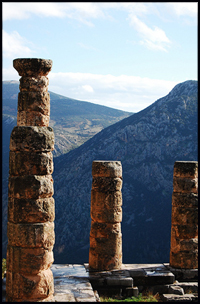 By PAT HARTMAN
By PAT HARTMAN
News Editor
“Lost Among the Gods: A family tempts fate on an ancient footpath near Delphi” – what an intriguing title. This story comes from Marcus Gee, via The Globe and Mail. Gee, who has been with his paper since 1991, has written extensively on foreign affairs and Asian business, and also contributes columns and articles such as this one about a Grecian holiday, which says:
It is quite simply the most beautiful place I’ve ever seen. The site of the Delphic sanctuary clings to the southern flanks of Parnassus. Limestone cliffs rise above it, glowing gold when the sun goes down. Below, a deep valley filled with olive trees sweeps down to the Gulf of Corinth, sparkling in the sun.
The mom and dad and three kids set out on a lovely hike, and amuse themselves by speculating on which actors should play which roles, if they were making a movie of a Greek myth. Well, we don’t want to give away the whole store, but there does come a time when the mom and dad are wondering if it would be a good idea to email somebody in North America to call the Delphi police.
The most beautiful place, according to Matthew Zaleski, a 19-year-old who has made a feature film, is in Australia, “that portion of the country located on the Gold Coast about 500 miles north of Sydney…” This article, by Cindy Leise, is really about how Zaleski got his movie project underway and accomplished. At a blog called The Line Stepper, Chris Sisson visits Boracay in the Philippines and says it is “the most beautiful place we have been to so far,” followed by an extensive description of exactly why. Mary McKinney names Grand Teton National Park – to the point where all four of her daughters married there. But really, the most beautiful place is SavuSavu in the Fiji Islands, in the eyes of Jacqui at Blooming in Japan.
Easel painter Jim Tait Lerwick, a.k.a. The Artistic Curmudgeon, believes that a place called Brugarth, which doesn’t even have a Wikipedia entry, but is in the Shetland Islands, is the one. At GlobeStompers, Jared, formerly a fashion sales executive, now travels without a deadline and thinks perhaps the Amalfi Coast, a part of Southwest Italy, could qualify for the title. And Mrs. B., at Confessions of a Pagan Soccer Mom, goes for St. Thomas, in the Virgin Islands.
Michael Forbes believes the most beautiful place on earth is his property near in Aberdeenshire, Scotland, located in the middle of where Donald Trump wants to build a golf course. This is a real interesting story.
Need we reiterate the opinion of Kevin Dolgin? Yes, we need. And he’s a bit sly about it, stating first only that Corsica is “the most beautiful island in the Mediterranean.” While he admits that “there may be other places that rival Corsica in terms of natural beauty,” we suspect he perhaps doubts it. And sure enough, a little while later, he comes out with the truth: “Corsica is, indeed, the most beautiful place in the world.”
Or not. There is certainly room for other opinions, right here at our handy Comment facility.
Delphi photo courtesy of Mendhak, used under this Creative Commons license


